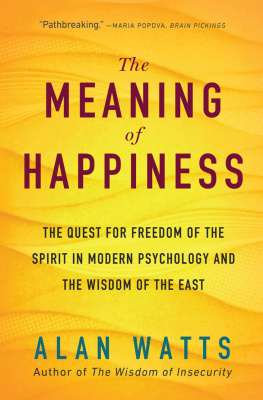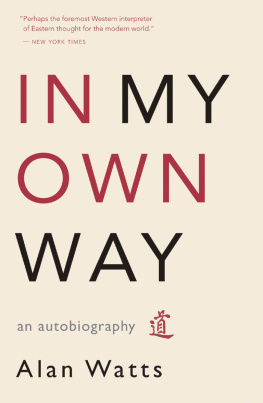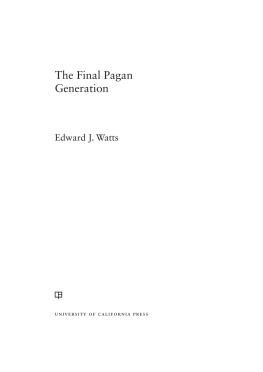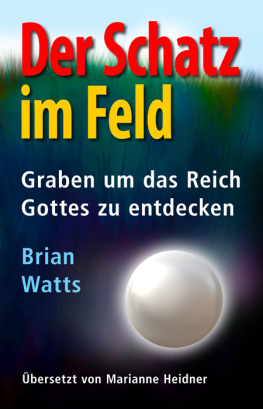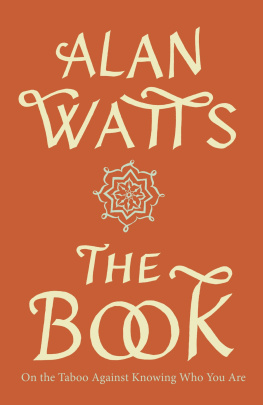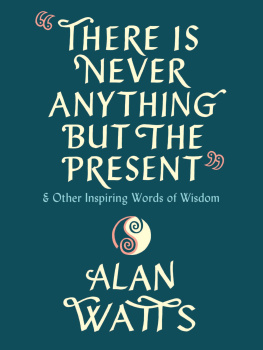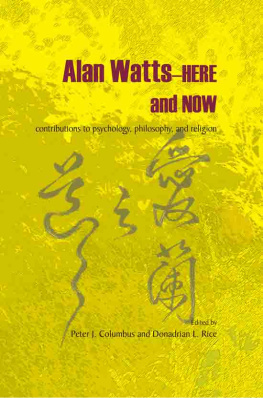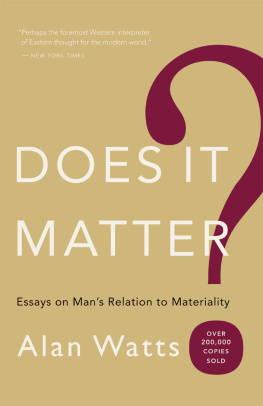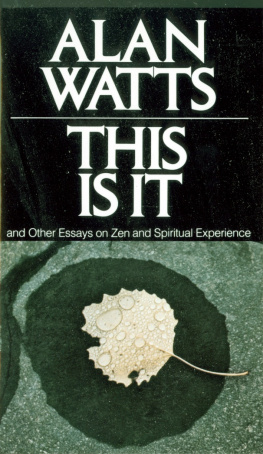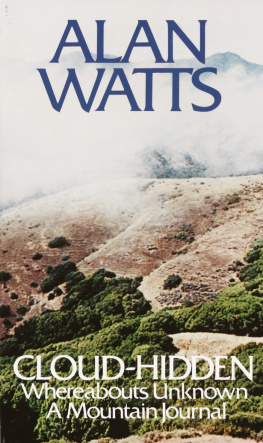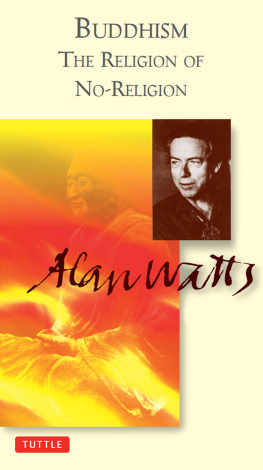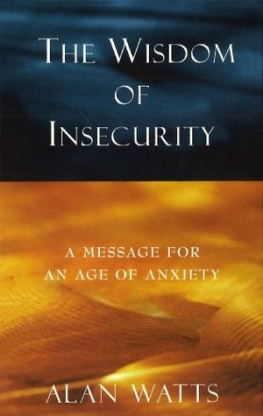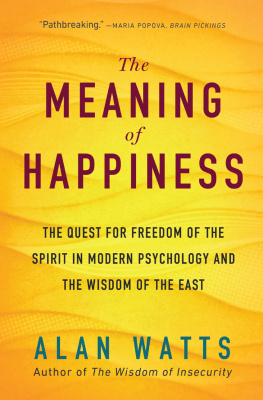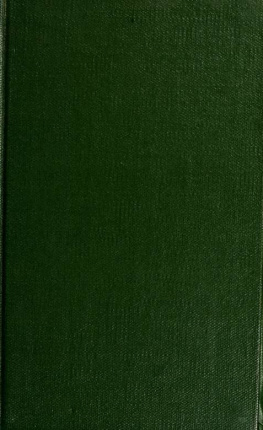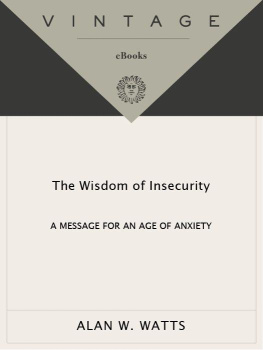Watts - The wisdom of insecurity: a message for an age of anxiety
Here you can read online Watts - The wisdom of insecurity: a message for an age of anxiety full text of the book (entire story) in english for free. Download pdf and epub, get meaning, cover and reviews about this ebook. City: New York, year: 2011, publisher: Knopf Doubleday Publishing Group;Vintage Books, genre: Religion. Description of the work, (preface) as well as reviews are available. Best literature library LitArk.com created for fans of good reading and offers a wide selection of genres:
Romance novel
Science fiction
Adventure
Detective
Science
History
Home and family
Prose
Art
Politics
Computer
Non-fiction
Religion
Business
Children
Humor
Choose a favorite category and find really read worthwhile books. Enjoy immersion in the world of imagination, feel the emotions of the characters or learn something new for yourself, make an fascinating discovery.

The wisdom of insecurity: a message for an age of anxiety: summary, description and annotation
We offer to read an annotation, description, summary or preface (depends on what the author of the book "The wisdom of insecurity: a message for an age of anxiety" wrote himself). If you haven't found the necessary information about the book — write in the comments, we will try to find it.
Watts: author's other books
Who wrote The wisdom of insecurity: a message for an age of anxiety? Find out the surname, the name of the author of the book and a list of all author's works by series.
The wisdom of insecurity: a message for an age of anxiety — read online for free the complete book (whole text) full work
Below is the text of the book, divided by pages. System saving the place of the last page read, allows you to conveniently read the book "The wisdom of insecurity: a message for an age of anxiety" online for free, without having to search again every time where you left off. Put a bookmark, and you can go to the page where you finished reading at any time.
Font size:
Interval:
Bookmark:
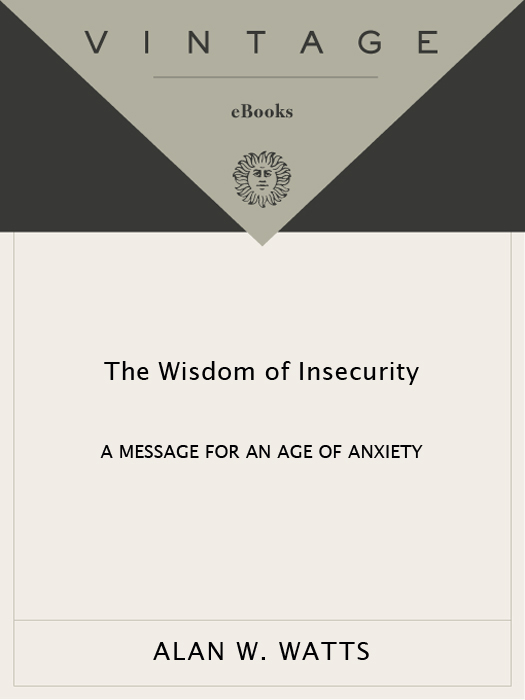
The Wisdom of Insecurity
Alan W. Watts, who held both a masters degree in theology and a doctorate of divinity, is best remembered as an interpreter of Zen Buddhism in particular, and of Indian and Chinese philosophy in general. Standing apart, however, from sectarian membership, he has earned the reputation of being one of the most original and unrutted philosophers of the twentieth century. Watts was the author of some twenty books on the philosophy and psychology of religion that have been published in many languages throughout the world, including the bestselling The Way of Zen. An avid lecturer, Watts appeared regularly on the radio and hosted the popular television series, Eastern Wisdom and Modern Life, in the 1960s. He died in 1973.
Behold the Spirit
The Book
Cloud-Hidden, Whereabouts Unknown
Nature, Man, and Woman
Tao
This Is It
The Way of Zen
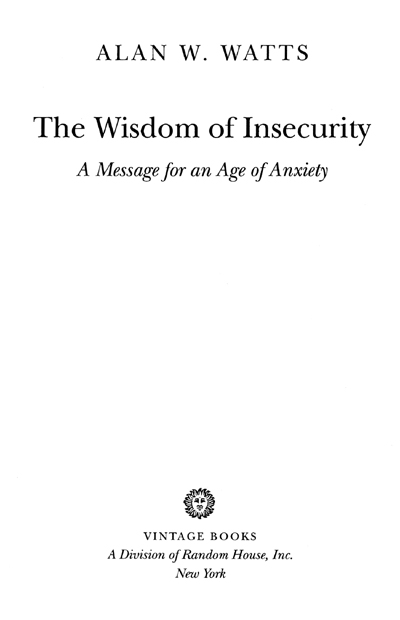
SECOND VINTAGE BOOKS EDITION, FEBRUARY 2011
Copyright 1951 by Pantheon Books,
copyright renewed 1979 by Mary Jane Yates Watts
Introduction copyright 2011 by Deepak Chopra
All rights reserved. Published in the United States by Vintage Books, a division of Random House, Inc., New York, and in Canada by Random House of Canada Limited, Toronto. Originally published in slightly different form in hardcover in the United States by Pantheon Books, New York, in 1951, and subsequently published in paperback by Vintage Books, a division of Random House, Inc., New York, in 1968.
Vintage and colophon are registered trademarks
of Random House, Inc.
The Cataloging-in-Publication Data for the Pantheon Books edition is
on file at the Library of Congress.
eISBN: 978-0-307-80986-5
www.vintagebooks.com
v3.1
TO DOROTHY
by Deepak Chopra
Every book is a journey, but this one aims to travel everywhere and nowhere. It begins in a state of anxiety, which few people want to dwell on. It punches holes in shared belief and treats sacred things with irreverence and cocky quips. As if to ensure its failure, Alan Watts also proposes a paradox that being insecure is a malady of the psyche and at the same time an open door to an invisible reality, the only place where the cures for fear and anxiety will ever be found.
Yet with all these elements going against it, The Wisdom of Insecurity, which was published in 1951, has found many spellbound readers, and Im proud to call myself one.
In my mid-thirties, about the same age as the author was when the book was published, I found in Watts the perfect guide for a course correction in life, away from materialism and its empty promises. The new course headed into the most elusive territory one can imagine: the present moment. Here and now, Watts declared, lies the experience of the universe in its totality. If happiness always depends on something expected in the future, we are chasing a will-o-the-wisp that ever eludes our grasp, until the future, and ourselves, vanish into the abyss of death. A typical Alan Watts pronouncement, sweepingly ambitious, offering help at the price of subverting everything the reader holds dear. For in postwar America, life was all about progress and the lure of tomorrow. Where were we headed? First to the moon and one day the stars. How much could we achieve? Everything. What would success bring us? Riches and contentment that could never be taken away. Watts was the gadfly who pricked us out of our sleep. Progress was a sham, he said, and dreaming about tomorrow was pure escapism from the pain we fear today. What is popularly called the power of now was being addressed fifty years before its time.
Looking back, one realizes that Watts was a spiritual polymath, the first and possibly greatest of that type. He read omnivorously in philosophy, religion, psychology, and sciencea sponge with a hundred arms, so to speak. He produced this little book at a turning point in his personal life. It was 1951, and he had just lost his vocation as an Episcopal priest, along with his young wife in a divorce. He had been following a longtime fascination with Zen Buddhism, leading him to spend his seminary years trying to fuse Eastern and Western mysticism. In the classic arc of coming-of-age tales, he was finally about to find himself. But he would do it in the strangest way, by declaring that there was no self to find. Lasting happinessthe underlying quest in almost all of Wattss copious writingcan only be achieved by giving up the ego-self, which is a pure illusion anyway. The ego-self constantly pushes reality away. It constructs a future out of empty expectations and a past out of regretful memories.
As Watts formulates it, in his brisk, deceptively simple style: tomorrow and plans for tomorrow can have no significance at all unless you are in full contact with the reality of the present, since it is in the present and only in the present that you live. Like a good preacher, he sounds emphatic and connected to a higher truth. But the message was too pushy and barbed for a comfortable Episcopal pulpit. Imagine any believing Christian, who cherishes the reward of Heaven and the second coming of Christ, hearing these words: There is no other reality than present reality, so that, even if one were to live for endless ages, to live for the future would be to miss the point everlastingly. With swift jabs Watts demolishes the afterlife and dashes any hope that there is a better world to come.
Watts was alone in the wilderness back then. For an eccentric to dabble in Eastern thought was acceptable in his native England. Because it possessed India and strong footholds in China, England produced some minds who were willing to delve deeper into Vedanta and Buddhism than the usual blinkered colonialist. But America was different. No one needed to hear from an upstart who fancied himself the Pied Piper of all things spiritual (Wattss own self-description was philosophical entertainer, although he was much more than that). But as I revisit the arguments offered so boldly in The Wisdom of Insecurity, I can feel the shock of truth that it produced in me.
His opening chapter, The Age of Anxiety, takes its title from a popular poem by W. H. Auden, and the first paragraph announces the first of Buddhas four noble truths, that life is full of suffering. Watts is canny enough not to mention the Buddha by name. Instead, he looks directly into the heart of a reader living under the shadow of the bomb, and poses an eternal question in terms that the existential fifties recognized: can it really be that human life is no more than a brief flicker of time, full of chaos and pain, between the darkness that precedes birth and the darkness that follows death? We live in a time of unusual insecurity, Watts notes, after a century when traditional valuesespecially religious beliefbroke down on all fronts. There have been two opposing reactions to the decay of belief: relief in tossing off the old shackles, and worry that reason and sanity will give way to chaos. But Watts wants to carve a third way, pointing out that belief has disappeared through careful doubt and examination. This is the first sign that he welcomes the insecurity others fear, and this quickly becomes the main theme. Without importing any Eastern notions that might scare readers off, Watts has already introduced the most basic Buddhist stance: sober examination of what lies before you, leaving aside all assumptions.
Font size:
Interval:
Bookmark:
Similar books «The wisdom of insecurity: a message for an age of anxiety»
Look at similar books to The wisdom of insecurity: a message for an age of anxiety. We have selected literature similar in name and meaning in the hope of providing readers with more options to find new, interesting, not yet read works.
Discussion, reviews of the book The wisdom of insecurity: a message for an age of anxiety and just readers' own opinions. Leave your comments, write what you think about the work, its meaning or the main characters. Specify what exactly you liked and what you didn't like, and why you think so.

